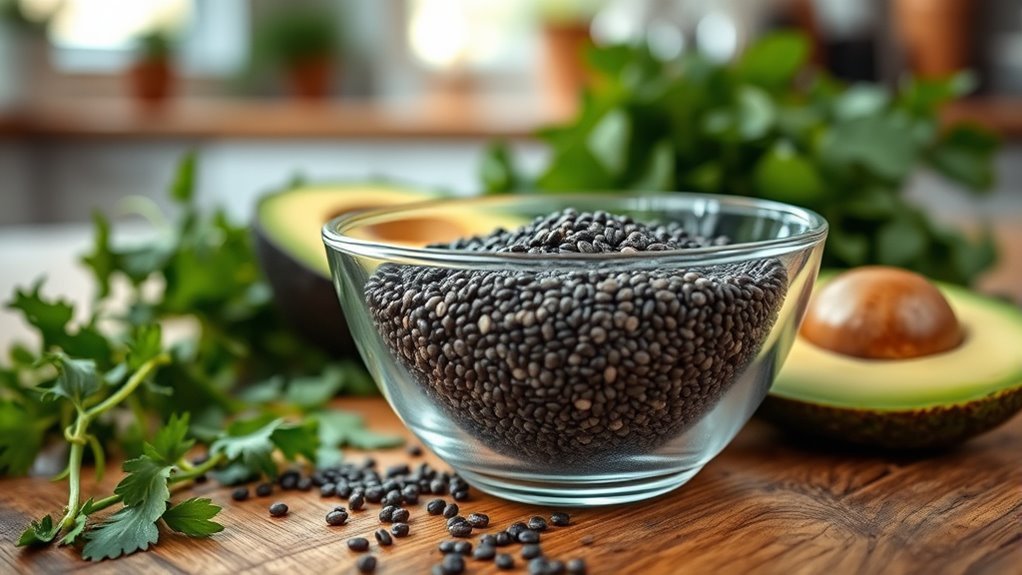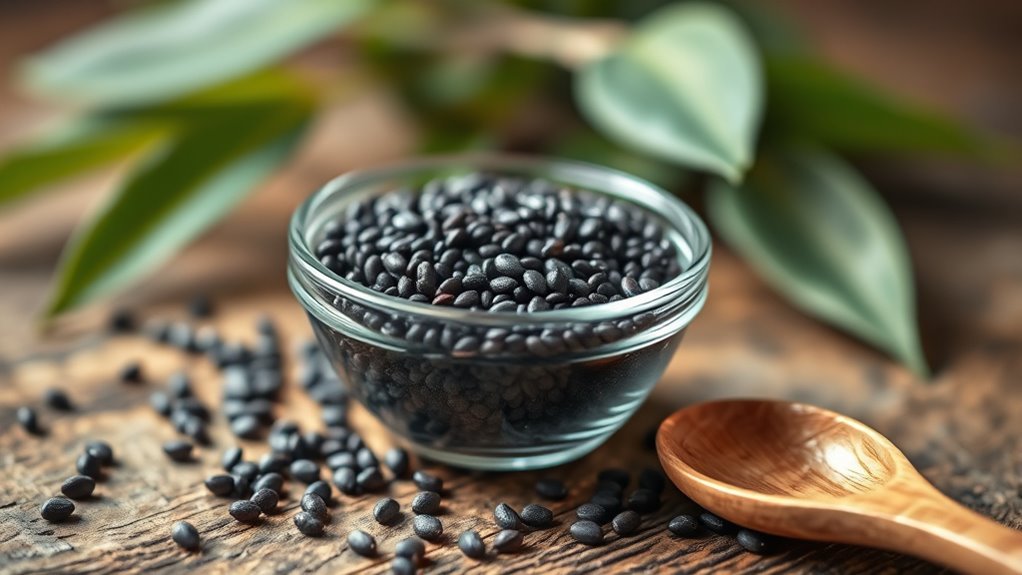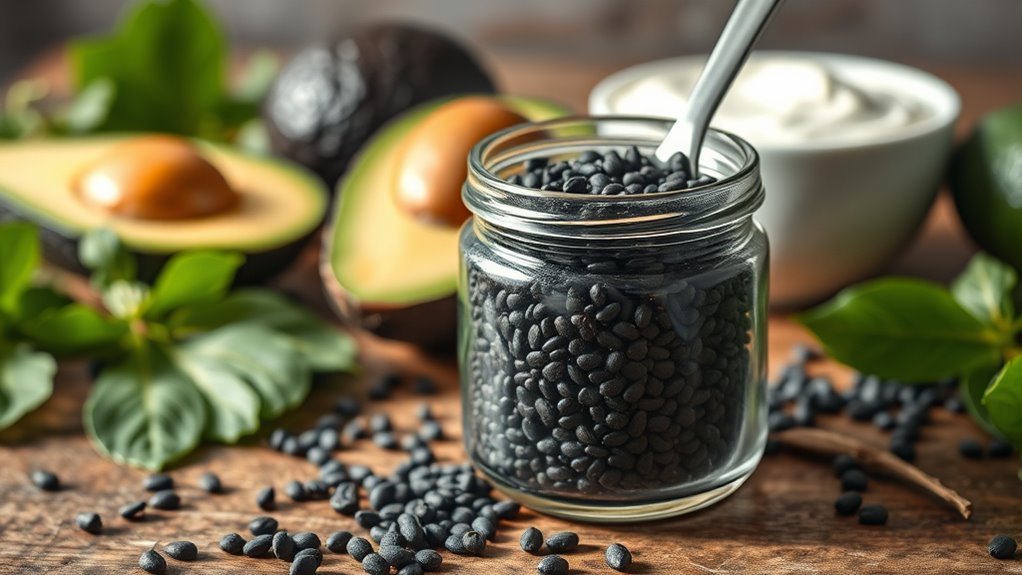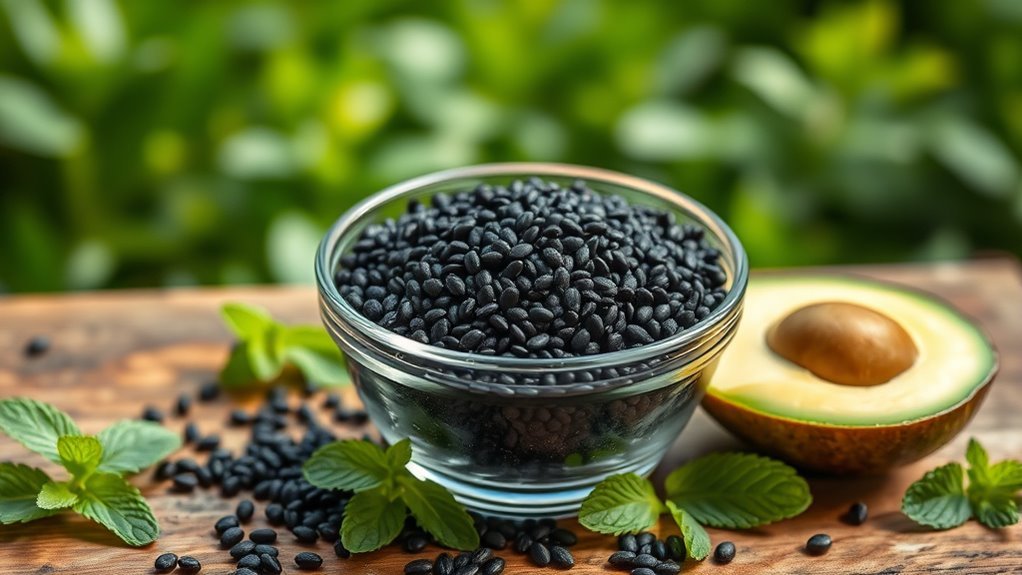Yes, chia seeds are keto-friendly. They’re low in net carbs, with about 2 grams per ounce, and high in fiber, which helps maintain satiety on a low-carb diet. Plus, they’re rich in omega-3 fatty acids and antioxidants, supporting heart health and overall well-being. However, it’s important to monitor your portion sizes, as overconsuming can impact ketosis. If you want to know more about how to incorporate them into your meals, keep exploring!
Understanding Chia Seeds and Their Nutritional Profile

When you think about nutritious superfoods, chia seeds often come to mind due to their impressive nutritional profile. These tiny seeds originate from the Salvia hispanica plant, which is native to Central America. Packed with omega-3 fatty acids, fiber, and protein, chia seeds offer numerous health benefits. For instance, they can aid digestion, improve heart health, and support weight management. Their high antioxidant content also helps combat oxidative stress in your body. Plus, chia seeds are incredibly versatile—they can be added to smoothies, oatmeal, or salads, enhancing both nutrition and texture. By incorporating these seeds into your diet, you embrace a natural way to boost your wellness while enjoying the freedom of a varied and satisfying meal plan. Additionally, chia seeds are low in net carbs, making them an excellent choice for those following a keto diet.
Carbohydrate Content of Chia Seeds

Chia seeds are not only rich in healthy fats and protein, but they also contain a significant amount of carbohydrates. When considering their carbohydrate content, it’s important to look at the carbohydrate breakdown to understand their net carbs. Here’s what you should know:
- Total Carbohydrates: One ounce (28 grams) of chia seeds has about 12 grams of carbs.
- Dietary Fiber: They provide approximately 10 grams of fiber, which is non-digestible.
- Net Carbs Calculation: Subtracting fiber from total carbs, you get about 2 grams of net carbs per ounce.
- Keto Compatibility: This low net carb count aligns well with ketogenic diets, allowing for freedom in meal planning.
Additionally, the high fiber content of chia seeds contributes to promoting gut health, making them an excellent choice for those on a keto diet.
Thus, chia seeds can fit nicely into your keto lifestyle!
Health Benefits of Chia Seeds on a Keto Diet

Although many people focus on macronutrient ratios in a keto diet, the health benefits of chia seeds should not be overlooked. These tiny seeds are packed with fiber, which can help you feel fuller for longer, making it easier to stick to your low-carb lifestyle. The omega-3 fatty acids found in chia seeds support heart health and reduce inflammation, essential for anyone on a keto diet. Additionally, chia seeds are rich in antioxidants, which combat oxidative stress and promote overall well-being. Their unique ability to absorb liquid can also aid in hydration, especially important when following a keto regimen. By incorporating chia seeds into your meals, you’re not just adding flavor but a range of chia seed benefits that support your health goals. Furthermore, when celebrating special occasions, you can enjoy keto birthday cake options that allow you to indulge without breaking your diet.
How to Incorporate Chia Seeds Into Your Meals
Incorporating chia seeds into your meals can be both simple and rewarding, especially for those on a keto diet looking to enhance their nutritional intake. Here are some easy ways to enjoy these nutrient-packed seeds:
- Chia Seed Pudding: Mix chia seeds with coconut milk and let it sit overnight for a delicious breakfast or snack.
- Chia Seed Smoothies: Blend chia seeds into your favorite low-carb smoothies for added texture and energy.
- Chia Seed Toppings: Sprinkle them on salads or yogurt for a nutritious crunch.
- Chia Seed Snacks: Create energy bars using chia seeds, nuts, and low-carb sweeteners.
Additionally, the high fiber content in chia seeds can enhance satiety and digestion, making them an excellent addition to your keto meals. With these chia seed recipes, you’ll find plenty of ways to enjoy their benefits while staying true to your keto lifestyle.
Chia Seeds vs. Other Keto-Friendly Seeds
When comparing chia seeds to other keto-friendly seeds, it’s essential to evaluate their unique nutritional profiles and health benefits. Chia seeds are high in fiber and omega-3 fatty acids, making them great for digestion and heart health. In contrast, pumpkin seeds are rich in magnesium and zinc, supporting immune function. Flax seeds also provide omega-3s but can be more beneficial for lowering cholesterol levels. Hemp seeds are a complete protein source, offering all essential amino acids, while sunflower seeds are packed with vitamin E and antioxidants. Each seed has its strengths, so incorporating a variety can enhance your diet’s nutritional diversity while keeping it keto-friendly. Additionally, incorporating healthy fats from sources like seeds can support your overall health and wellness. Your choice ultimately depends on your personal health goals and taste preferences.
Potential Drawbacks of Chia Seeds on a Keto Diet
While chia seeds are often praised for their health benefits, you should be aware of their relatively high carbohydrate content, which might impact your ketosis if consumed in large amounts. Additionally, some people experience digestive discomfort, such as bloating or gas, when incorporating chia seeds into their diet. Balancing these factors is essential for maintaining a successful keto regimen.
High Carbohydrate Content
Although chia seeds are often praised for their health benefits, their relatively high carbohydrate content can pose challenges for those adhering to a ketogenic diet. Here are some considerations to keep in mind:
- Carbohydrate Count: Chia seeds contain about 12 grams of carbohydrates per ounce, which can quickly add up.
- Net Carbs: After accounting for fiber, the net carbs are around 1 gram per ounce, but that still matters on a strict keto plan.
- Dietary Restrictions: If you’re on a tight carb limit, even small amounts can impact ketosis.
- Serving Sizes: You might need to limit your serving size to stay within your carbohydrate goals.
Additionally, it’s essential to monitor your overall carb intake to ensure you remain within the recommended limits for ketosis.
Balancing these factors can help you enjoy chia seeds while respecting your dietary restrictions.
Digestive Discomfort Potential
Despite their numerous health benefits, chia seeds can sometimes lead to digestive discomfort, especially for those on a keto diet. High in fiber, these tiny seeds can cause digestive issues if your body isn’t used to increased fiber intake. Gradually incorporating them into your diet may help minimize discomfort.
| Potential Issues | Symptoms | Tips to Manage |
|---|---|---|
| High Fiber Content | Bloating | Start with small amounts |
| Hydration Requirement | Cramping | Drink plenty of water |
| Individual Sensitivity | Gas | Monitor your intake |
Listening to your body is key. If you experience significant digestive issues, consider adjusting your chia seed consumption or consulting with a healthcare provider for personalized advice.
Tips for Choosing and Storing Chia Seeds
Choosing and storing chia seeds properly can greatly enhance their nutritional benefits and shelf life. Here are some tips to help you make the most of your chia seeds:
- Choose Quality: Look for organic, non-GMO chia seeds that have a fresh aroma and a vibrant color.
- Check the Expiration Date: Always buy seeds with a longer shelf life to guarantee you’re getting the most nutrients.
- Proper Storage: Store chia seeds in a cool, dark place, ideally in an airtight container to prevent moisture and oxidation.
- Refrigerate for Longevity: If you buy in bulk, consider refrigerating them to extend freshness and nutrient retention.
Frequently Asked Questions
Can Chia Seeds Cause Digestive Issues on a Keto Diet?
Chia seeds can cause digestive issues on a keto diet for some people, especially if you’re not used to high fiber intake. They’re rich in soluble fiber, which may lead to bloating or discomfort if consumed in excess. To maintain digestive comfort, start with small amounts and gradually increase as your body adjusts. Staying hydrated can also help mitigate any potential digestive discomfort while enjoying the benefits of chia seeds in your meals.
How Do Chia Seeds Compare to Flaxseeds for Keto?
Chia seeds and flaxseeds? It’s like picking between a rock and a hard place, isn’t it? Chia seeds shine with their omega-3s and fiber, offering digestive benefits while keeping you full. Flaxseeds, on the other hand, boast a slightly higher protein content and are rich in lignans, which may support heart health. Both are great, but if you’re after a smoother digestive ride, chia seeds might just be your best buddy on keto!
Are There Any Allergies Associated With Chia Seeds?
Yes, there are some potential allergies associated with chia seeds. While rare, chia seed allergies can cause reactions like itching, hives, or gastrointestinal distress. If you have a history of allergies to other seeds, you might be more susceptible to chia seed sensitivity. It is crucial to introduce them slowly into your diet and monitor for any adverse reactions. Always consult with a healthcare professional if you suspect an allergy for personalized guidance.
Can Chia Seeds Help With Weight Loss on Keto?
Chia seeds can indeed support your weight loss journey on keto. Their high fiber content helps keep you full, reducing cravings and aiding portion control. When used as a keto meal replacement, they provide essential nutrients while keeping carbs low. Plus, chia seeds’ ability to absorb water creates a gel-like consistency, enhancing satiety. By incorporating them into your meals, you’re not only enjoying their benefits but also embracing a nutritious, fulfilling lifestyle.
Do Chia Seeds Need to Be Soaked Before Consumption?
You don’t have to soak chia seeds before consumption, but doing so offers several benefits. Soaking enhances their digestibility and allows them to absorb water, creating a gel-like consistency that can aid in hydration and satiety. You can consume them dry, but they may absorb moisture in your stomach, which could lead to discomfort. Whether you soak them or not, experimenting with different consumption methods can help you find what works best for you.
References
- https://www.healthline.com/nutrition/chia-seeds-and-keto
- https://www.ncbi.nlm.nih.gov/pmc/articles/PMC6832424/
- https://www.webmd.com/diet/obesity/what-are-chia-seeds
- https://www.medicalnewstoday.com/articles/325249
- https://www.nutrition.gov/topics/nutrition-101/nutritional-supplements/chia-seeds
- https://www.bbcgoodfood.com/howto/guide/what-are-chia-seeds
- https://www.hindawi.com/journals/jnume/2020/6187652/


